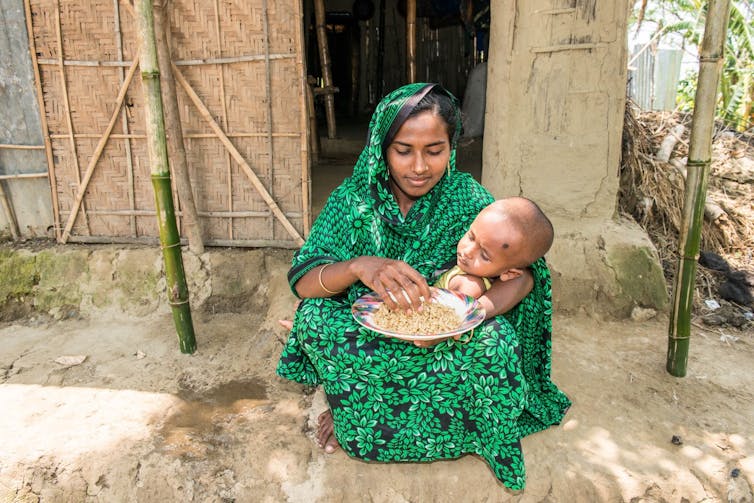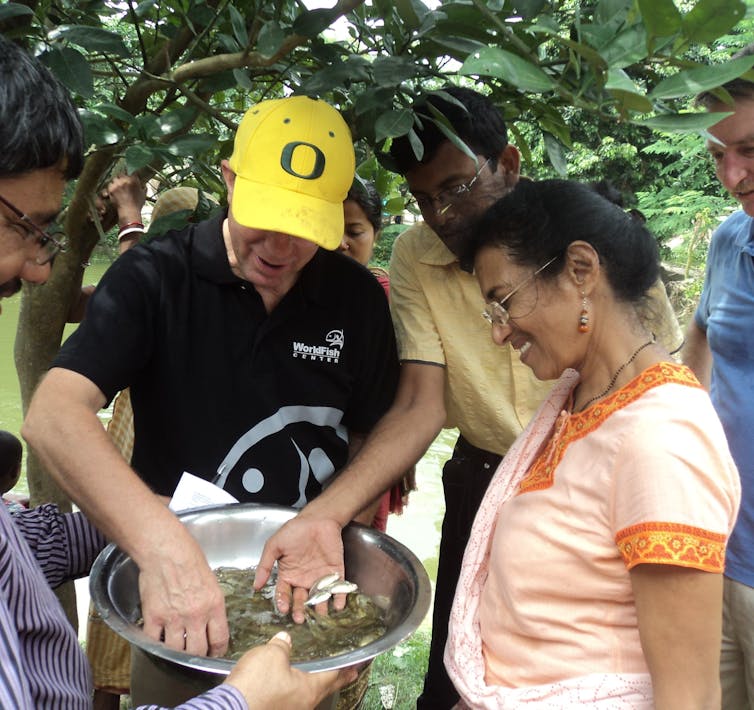
Fish and other aquatic foodstuff are integral to meal plans for much more than 1 billion individuals worldwide. Most of these men and women stay in very low- and center-money nations in Africa, Asia and the Pacific, close to rivers, lakes or the sea.
In these regions, food items like contemporary and dried fish are central to community cuisines, and are normally more cost-effective or a lot more out there than options like eggs, dairy goods and fruit. These “aquatic superfoods” pack an outsized punch as loaded resources of micronutrients that are crucial to human health and cognitive advancement.
However, aquatic foods are usually on the margins of mainstream agricultural research, nourishment insurance policies and progress techniques. Typically, international growth thinkers have targeted on staple crops and livestock as options to hunger.
On May possibly 11, 2021, the Globe Foodstuff Prize Foundation in Des Moines declared that its 2021 laureate is Shakuntala Haraksingh Thilsted, a nutrition scientist who in my see has done a lot more than any individual to attract consideration to the critical but typically overlooked position of aquatic foodstuff in sustainable nutritious weight loss plans. This $250,000 prize is often referred to as the Nobel Prize for food and agriculture. It was recognized by Norman Borlaug, winner of the Nobel Peace Prize in 1970 for his function in world-wide agriculture.
This year’s award acknowledges Thilsted’s 4 a long time of do the job to strengthen nourishment and wellness for hundreds of thousands of malnourished little ones and their moms in Asia and Africa. As an aquaculture researcher who will work intently with Thilsted, I feel this award spotlights the need to have to prioritize fish and aquatic food items in nourishment insurance policies and actions, nationally and globally.
A daily life aquatic
Shakuntala Thilsted was born in Trinidad and Tobago, where she commenced her pathbreaking career as the only woman employed in the Ministry of Agriculture, Lands and Fisheries. Soon after moving to Denmark, she finished a Ph.D. at the Royal Veterinary and Agricultural University, where she later went on to direct the Office of Animal Physiology.
Shifting to Bangladesh in the late 1980s, Thilsted worked at the icddr,b, an institute previously identified as the Intercontinental Centre for Diarrhoeal Disorder Investigation, which handled additional than 6,000 malnourished little ones on a yearly basis. As a younger mother of two small children, she was instinctively involved about youngster wellbeing and nourishment and started investigating actions to protect against malnutrition working with regionally accessible and culturally acceptable foodstuff.
Substantial time in the discipline planning and applying a nutrition rehabilitation application allowed Thilsted to understand what meals men and women ended up taking in and how. Listening to women of all ages speak about the great importance of taking in compact fish for great wellbeing and vision piqued her interest in their nutritional benefit. This perception supplied the catalyst for the subsequent a few decades of her exploration vocation.
On returning to Denmark, Thilsted began instructing graduate pupils at the University of Copenhagen to review micronutrients in fish from Bangladesh. This investigate discovered that a lot of species of modest fish are loaded in nutrition that are critical for human health.
A person fish in certain, mola (Amblypharyngodon mola), was found to include really significant ranges of vitamin A, which is essential for vision, the immune method and copy. Armed with this rising entire body of proof, Thilsted established out to raise usage of modest fish, in particular for moms and youngsters.

Scaling up innovations
Aquatic foods are significantly vital from conception to a child’s 2nd birthday. Not consuming ample micronutrients these as iron, zinc, vitamin A and vitamin B12 improves the possibility of disease, maternal and infant mortality, stunting and very poor cognitive general performance. Undernutrition accounts for up to 45% of all preventable boy or girl fatalities.
In 2010, Thilsted joined the international research institute WorldFish. She returned to Bangladesh to do the job at scaling up “nourishment-delicate strategies” to fish generation, developing on insights from her earlier study.
Her earlier do the job confirmed that little fish like mola develop perfectly in farm ponds alongside more substantial fish these kinds of as carp. Simple adjustments to the way smaller fish were harvested from ponds, these types of as utilizing various varieties of fishing net, enhanced women’s part in their production. Elevating little fish in this way proved be a highly price tag-effective way of decreasing the load of malnutrition.
Thilsted also began investigating ways to supply micronutrients to moms and little ones employing fish-based goods these types of as powders, chutneys and wafers as a culturally acceptable way to enhance their diet programs. WorldFish has promoted these innovations commonly to nations including Cambodia, India, Myanmar, Nepal, Malawi, Sierra Leone and Zambia.
From research to coverage
Thilsted has labored tirelessly to translate critical insights from her investigate into general public coverage. This has integrated partnering carefully with governments, these as the State Authorities of Odisha, India, which not long ago started together with dried fish in meals rations that it provides to susceptible teams.
She also has recommended an array of substantial-profile intercontinental corporations, including the Foods and Agriculture Corporation of the United Nations, the U.S. Agency for Global Improvement, the Intercontinental Fund for Agricultural Enhancement and UNICEF. Her attempts have elevated consciousness of the worth of aquatic food items in balanced food systems and fostered broader commitments to supporting this transformative role.
Thilsted has lived for many years in the nations around the world where she seeks to generate beneficial alter. She is passionate about expending time in the discipline, observing carefully and inquiring the appropriate thoughts.
This spirit of inquiry and intensive arms-on encounter, put together with superior criteria of academic rigor, have presented increase to quite a few of her most essential insights. For example, she found that wild capture fisheries and fish farming can both make very complementary contributions to food items and nutrition protection.
As I have viewed firsthand, Thilsted also has a distinctive ability to hook up with people today irrespective of their social position, from females farmers in rural Bangladesh to significant officials at the United Nations. Generations of young researchers, myself incorporated, have flourished beneath her mentorship and have been influenced by her remarkable vision, persistence, generosity and motivation to nourishing persons and the world.
This write-up is republished from The Conversation underneath a Imaginative Commons license. Browse the primary write-up.
